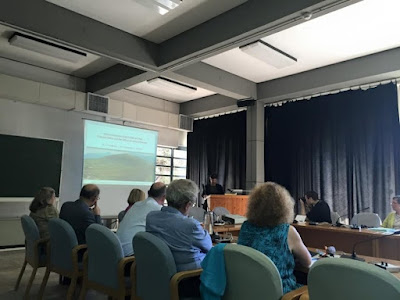Kastro Kallithea was an ancient city in Achaia Phthiotis which saw a strong urban development in the Hellenistic period. One of KKAP’s major research questions is how Kallithea’s cityscape was sustainable in a setting where families relied to a large degree on a pastoralist lifestyle. We like to address this question with a ‘bottom up’ approach: how and to what extent could households not only be self-sufficient, but also contribute to and support the development and maintenance of an urban environment in a volatile and rapidly changing political context? The KKAP team members tackle this question from perspectives ranging from land and land use to subsistence strategies, economic exchange, the materiality of household activities and urban planning. At the same time, the team contextualizes the development of this urban centre in the history of the Ethnos of Achaia Phthiotis.
During the 2015 study season, Laura Surtees, Myles Chykerda (UCLA) and Margriet Haagsma presented a paper on ‘ethnic’ identity and foreign relations in Achaia Phthiotis at the conference: Greek Ethnos States; Internal Mechanics, External Relations at the European Cultural Centre at Delphi, organized by Hans Beck (McGill) and Kostas Buraselis (Athens) in May 2015.
Of course most work during the study season was spent on processing the archaeological finds. Colette Beestman-Kruijshaar directed the processing of thousands of fragments of Hellenistic pottery, finding joins, counting and weighing them according to ware and form. Tracene Harvey worked on the coins and coin circulation in Kallithea, which she is allowed to compare with the hitherto unpublished coin assemblages found at ancient Pharsalos and the recently excavated Hellenistic mansion at Tserli near Lake Karla by Sophia Karapanou. Laura Surtees worked on preparing the flotted soil samples for study by our paleoethnobotanist René Cappers (Groningen) and our zooarchaeologist Michael MacKinnon (Winnipeg). The latter spent a week with us to study the faunal remains of Building 10.
A most exciting new pilot project related to KKAP is one spearheaded by Sandra Garvie-Lok (Alberta) a specialist in human diet. In order to better answer the questions whether the inhabitants of the region were involved in transhumant pastoralism she and Michael MacKinnon selected a number of sheep and goat jaws and teeth found at secure contexts at Kallithea and at Sophia Karapanou’s excavations at ancient Pharsalos which we hope to send for analysis of the animals’ teeth enamel. Possible variation in isotopic levels along the length of the teeth could indicate seasonal mobility, perhaps between the lower hillsides and the summer pastures in the Othris Mountains.
The University of Alberta (UofA) graduate student team members continued working on their individual projects: Amber Latimer (our apothiki administrator) on moulded wares, Lindsay Prazak on loomweights, Tristan Ellenberger on stone finds, Gino Canlas on pithoi, Ed Middleton on lamps, Karey Rodgirs on cooking pottery, Adam Wiznura on unguentaria, Lauren Harding on roof tiles and Matt Gabert on wall plaster. We plan to finalize the quantification and plotting of the finds of Building 10 next year.
The fifteen UofA field school students arrived in early June and were taught a multitude of course modules ranging from ‘Hellenistic ceramics,’ ‘Drawing’ and ‘Photography’ to ‘Numismatics’ and ‘Faunal Remains.’ Several excursions were made to museums and ancient sites in eastern Thessaly. Check out the blogs students wrote on their experience in the field school at: www.ualbertaclassics.wordpress.com
At the request of the Ephorate and the Mayor of Pharsala, Aris Karachalios, Karey, Matt and Gino made a film of what a study season at Kallithea is like. On June 9th 2015 we showed it to the citizens of Pharsala at a festive evening offered by the Municipality in the Cultural Centre. It can be found at: https://www.youtube.com/watch?v=zQW2rvQLhc0&feature=youtu.be
The KKAP team would like to warmly thank Mayor Karachalios, Pharsala’s enthusiastic archaeologist Vaso Noula, and Pharsala’s municipal council for their incredible support. Thanks also go to the Ephorate of Antiquities of Larissa and its proistameni Stavroula Sdrolia. As always, we are indebted to Narthaki’s welcoming population, most notably Elias Papadopoulos, whose energetic presence is priceless, and his mother Evangelia Papadopoulou, who cooks the best Greek meals one can think of. From the Canadian side we are deeply humbled by our Greek colleagues and friends who are able to offer so much support and hospitality, even under the current difficult circumstances. Chapeau and a big thank you to all!
Margriet Haagsma, Sophia Karapanou & Laura Surtees





No comments:
Post a Comment